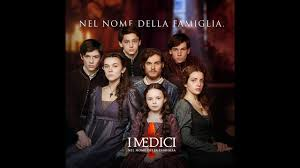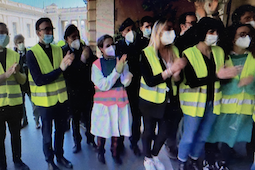Review: Medici The Magnificent - Part 2

After binge watching the second in the Medici series on Netflix last summer, I looked forward to the third and final series, 'Medici: The Magnificent - Part 2'. Set again in fifteenth century Florence, it had already been filmed and it was rumored that with an increased focus on Lorenzo the Magnificent, a generous patron of the arts, it would feature great artists nurtured by him - Leonardo Da Vinci, Michelangelo and Botticelli. Also, we might see clashes with the fanatical Dominican friar Girolamo Savonarola who roused Florence with a radical call for Christian renewal, even removing paintings and sculptures that, he felt, prompted temptation to sin.
Well the third series was released on Netflix last week and it did not disappoint. I watched all eight episodes over three nights. It could have been all at one go but I do have to work as well! I found it completely engaging. The viewer is drawn in by spectacular cinematography - partly captured by drones - of the stunning landscape of Tuscany and its towns which have changed little over the intervening 500 years, such as Volterra, Montepulciano and Pienza. Then there is the beautiful soundtrack, lavish costumes and set design and an excellent cast, particularly Daniel Sharman as Lorenzo, Sarah Parish as his mother Lucrezia and Sebastian De Souza as Botticelli.
Contemporary issues feature here - such as fear of illness and early death, fear of war and its disruption of society, social inequalities which bubble into resentment, the struggle of women to participate in decision-making. Yet, I was struck most by the power of one family - in this case a rich banking family - to dominate the political and cultural scene of their age through commerce. Money brings power. The Medici Bank was one of the most prosperous institutions in Europe, and the Medici were considered the wealthiest European family for a time. From this base, they acquired political power, initially in Florence and later in wider Italy and Europe. They contributed to making Florence the 'city of the Renaissance' we love today. And for Catholics, the series offers an intriguing glimpse into the papacy, with tentacles into all areas of life at that time and its use (and abuse) of power. For example, one incident that damages the Medici and the citizens of Florence is the use of papal excommunication as a weapon.
Season 3 resumes after the Pazzi Conspiracy, the dramatic historical event which attempted to displace the Medici and where Lorenzo's brother, Guiliano, is murdered during a Mass in Florence Cathedral. Lorenzo only just escapes assassination himself and he seeks revenge against the conspirators and their backer Pope Sixtus IV in Rome. He has to mind his back in Florence too because Savonarola is inciting the people against Medici dominance. The wheelings and dealings in the stories are truly Machiavellian - an appropriate description because Niccolo Machiavelli is in there too. We see Lorenzo travel to Naples to form a network of alliances, and we see him influence the papal election after the death of Pope Sixtus amidst shocking corruption and nepotism. A Leonardo Da Vinci war machine is seen in use to intimidate a small town to repay a debt to the Medici.
More thrilling though is seeing the great artists in action and we see such Renaissance masterpieces as Botticelli's painting 'The Birth of Venus' and Michelangelo's marble statue 'David' at the end as a tribute to Lorenzo's patronage of the arts. He achieved so much before his death at the age of only 43 years in 1492, and his support of the arts is his greatest legacy, but as the head of the Medici family his desire to manipulate the political world around him led him up some morally dubious paths. People are complicated and 'Medici' deftly makes that point numerous times. I love the beautiful scene where Lorenzo visits Michelangelo's studio to marvel at the beauty of a sculpture of a battle scene depicting, as the artist puts it, "the battle between civilization and savagery". Revealing his internal struggle, Lorenzo responds, "No, it is the fight within us". The theme of whether ends justify means comes up throughout Series 3, just as it did in Series 2. Lorenzo values peace and diplomacy but tolerates violence when he deems it the only strategy possible.
Lorenzo on his deathbed asks to see Savonarola, who comes, and they tussle one last time. "I don't regret the beauty that flowered here" says Lorenzo, but Savonarola tells him that "God has commanded me to destroy it all" and suggests that the names of the great artists will be forgotten. Lorenzo replies, "I don't think so" and "beauty brings us closer to God". Savonarola survives Lorenzo by six years - a period, thankfully, not covered by the series, which would see the 'Bonfire of the Vanities', where many great works of art and books were destroyed, and Savanarola's gruesome execution as the people of Florence tired of his Puritan ways.
So, the story of the Medici under Lorenzo the Magnificent is gripping, especially for Catholics who appreciate the legacy of great religious art in so many Italian churches and museums. Also, to see the operations of the papacy at that time. Lorenzo's son and nephew went on to become popes. In fact, the son - Pope Leo X (Giovanni di Lorenzo de Medici) was the pope involved with the sales of indulgences that led to Martin Luther's 95 Theses. And note that he was the last pope not to have been in priestly orders at the time of his election to the papacy! Both were also great patrons of the arts in Rome, including the rebuilding of St Peter's Basilica.
The series is thought-provoking, going beyond the realm of sheer entertainment value. I would like the series to get more publicity and this is my contribution.
See Trailer at: www.netflix.com/gb/title/80152118


















